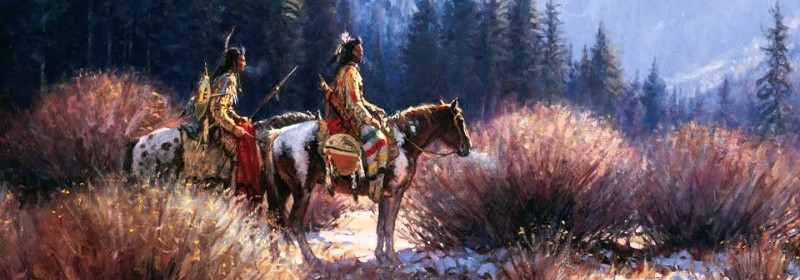


The tenth song in the series, saw us in England. The eleventh sees us cross The Pond, and focus on the vast injustices done to the indigenous tribes of Native Americans. They have never had a more passionate and eloquent spokesperson than Canadian Buffy Sainte-Marie, and I have chosen this very famous cri de coeur below, to go under my magnifying glass...
Let's look at the lyrics... Please read them at least twice before continuing with this study. Not just for their intrinsic beauty, but also because they contain several historical references that non-North American me, will do my best to unpack.
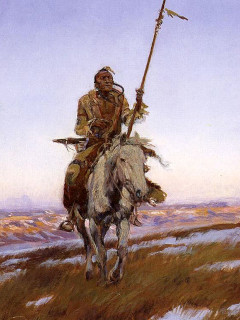
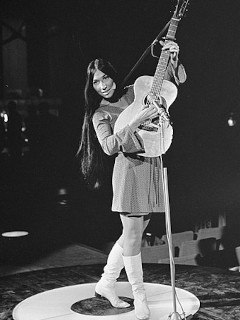
My Country ‘Tis Of Thy People You’re Dying Now that your big eyes have finally opened, Now that you're wondering how must they feel, Meaning them that you've chased across America's movie screens. Now that you're wondering how can it be real That the ones you've called colorful, noble and proud In your school propaganda They starve in their splendor? You've asked for my comment I simply will render: My country 'tis of thy people you're dying. Now that the longhouses “breed superstition” You force us to send our toddlers away To your schools where they're taught to despise their traditions. You forbid them their languages, then further say That American history really began When Columbus set sail out of Europe, then stress That the nation of leeches that conquered this land Are the biggest and bravest and boldest and best. And yet where in your history books is the tale Of the genocide basic to this country's birth, Of the preachers who lied, how the Bill of Rights failed, How a nation of patriots returned to their earth? And where will it tell of the Liberty Bell As it rang with a thud O'er Kinzua mud, And of brave Uncle Sam in Alaska this year? My country 'tis of thy people you're dying. Hear how the bargain was made for the West: With her shivering children in zero degrees, Blankets for your land, so the treaties attest, Oh well, blankets for land is a bargain indeed, And the blankets were those Uncle Sam had collected From smallpox-diseased dying soldiers that day. And the tribes were wiped out and the history books censored, A hundred years of your statesmen have felt it's better this way. And yet a few of the conquered have somehow survived, Their blood runs the redder though genes have been paled. From the Gran Canyon's caverns to Craven’s sad hills The wounded, the losers, the robbed sing their tale. From Los Angeles County to upstate New York The white nation fattens While others grow lean; Oh the tricked and evicted they know what I mean. My country 'tis of thy people you're dying. The past it just crumbled, the future just threatens; Our life blood shut up in your chemical tanks. And now here you come, bill of sale in your hands And surprise in your eyes that we're lacking in thanks For the blessings of civilization you've brought us, The lessons you've taught us, The ruin you've wrought us -- Oh see what our trust in America's bought us. My country 'tis of thy people you're dying. Now that the pride of the sires receives charity, Now that we're harmless and safe behind laws, Now that my life's to be known as your "heritage," Now that even the graves have been robbed, Now that our own chosen way is a novelty -- Hands on our hearts we salute you your victory, Choke on your blue white and scarlet hypocrisy Pitying the blindness that you've never seen That the eagles of war whose wings lent you glory They were never no more than carrion crows, Pushed the wrens from their nest, stole their eggs, changed their story; The mockingbird sings it, it's all that he knows. "Ah what can I do?" say a powerless few With a lump in your throat And a tear in your eye -- Can't you see that their poverty's profiting you? My country 'tis of thy people you're dying.
Nat Hentoff, in his liner notes for her album, Little Wheel Spin And Spin, (1966), quotes her as saying..."My point in the song is that the American people haven't been given a fair share at learning the true history of the American Indian. They know neither the state of poverty that the Indians are in now, nor how it got to be that way. I try to tell the side of the story that's left out of the history books, that can only be found in the documents, the archives and in the memories of the Indians themselves."
And many years later, she was to say to Amy Goodman of Democracy Now!... “I wanted to give people [worldwide, an] ‘Indian 101’ in six minutes. It’s a long song. But ‘Indian 101’ has never been presented to the North American public, let alone anywhere else.”
Here she is aged 25, in 1966, performing this magnificent song on the late Pete Seeger’s TV show, Rainbow Quest. Note at the start and at 4.33, the rapt attention of the then 47 year old Seeger... in thrall to her powerful vibrato and profound delivery...
Before we look at the song more closely, let me just state - what is perhaps to some of my readers - the ‘bleedin obvious’: viz... that when looking at a song, it is often close-on impossible to divorce the song from the performance of it. Let me elaborate.
Until 2017, when immobility meant I decided to call it a day, I was honoured to spend 15 unbroken years on a BBC four person jury, judging an annual regional song competition, whittling down the entries to a top ten, and then attending Finals Night at a packed local theatre... and then choosing the best song on the night. I thank the BBC for their repeated confidence in me.
Some of those nights were packed with great warmth and emotion: nights when we jury members passionately made the case for the songs we individually favoured, while audience members (many with long drives home and work in the morning) sat fanning themselves like in the novel/movie To Kill A Mockingbird, impatient for the jury to return to the auditorium from the jury room with their verdict. And to ensure we never confused song and performance, we gave an additional prize to the best performer of the night. This prize was an afterthought, introduced a few years into the history of the contest: it was deemed necessary as some jurors felt their love for a song was possibly influenced by an incredibly strong performance.
And this was how I arrived at my own ‘rule of thumb’ when it came to judging the two separate prizes...
Let’s take it in reverse, and first deal with the performance prize.
I found that the easy one to decide upon. All I did was imagine all the performers singing every song. Would they have done such a good job on it? More often than not, the answer was “possibly”... but usually every year, there was one performance that you knew in your bones that none of the other finalists could even get remotely close to topping. And paradoxically, some of the ‘best performance’ prize winners, were singing some of the weaker songs. How come? Well, just that they were able to get more out of their own song, than any of the competitors did with their songs on the night.
As for the big prize – the ‘best song’ – well that was far more complex. First of all, it had to be a true song: that’s to say there was no use it being a gorgeous melody with forgettable lyrics, or the opposite, one of words of genius married to an unmemorable tune. And then, when you had a true song, you had to decide on how much you were being swayed by your personal interest in what was often the real-life story behind the song. Just because it’s a great story, does not make it a great song. Indeed I can think of a few turkeys down the years where writers have thrown away a great story with their pedestrian, unimaginative lyrics and lack of melodic flare.
Oops... why am I telling you all this? After all, I am supposed to be Dai-ssecting a specific song here, and not digressing/Dai-gressing down Memory Lane.
Well, I make no apologies: I submit that it is all directly pertinent in this case. Because here, with My Country ‘Tis Of Thy People You’re Dying, you have a song which would win any ‘best song contest’ hands down, and would also win the coveted double, of bagging the ‘best performance’ prize at the same time...!! For every superlative is found wanting when it comes to Buffy Sainte-Marie.
Youngsters who never saw her in her pomp, might reasonably ask “Who is she?” Well, baby Beverly Sainte-Marie was born on February 20th, 1941 on a Cree Indian reservation in Saskatchewan, Canada. I have read that she was orphaned when still a baby, when both her parents died in quick succession. She was immediately adopted by Albert and Winifred Sainte-Marie, given by them the nickname of ‘Buffy’, and grew up in Maine and later in Wakefield, Massachusetts. She was a bright and studious kid who grew up to attend the University of Massachusetts Amherst, and earn a BA and a PhD in teaching and Oriental philosophy.
She had a stellar career, and believe it or not is still doing live performances today, at 80 years of age.
I first saw her in the flesh at a folk festival in Bardney, in the UK, on my first ever visit to England’s second biggest county: Lincolnshire. She was just 30 years old then. I knew of her work, and possessed one of her albums, so she obviously hardly came as a total surprise: but it’s fair to say that she did surprise me by the way she mesmerised me that day. Such passion...!!... coupled with vocal and instrumental excellence.
And by golly, those qualities are so evident here in what – I submit - is her greatest song. Oh for sure, she wrote songs that sold ten times better, like Universal Soldier and Until It’s Time For You To Go... and also got a co-writer credit on the Oscar winning song Up Where We Belong (from the movie An Officer And A Gentleman), but never was she finer than here, in a song she started formulating at the astonishingly young age of 18/19 (along with a sister song, the 1964 Now That The Buffalo’s Gone), putting it away for a few years in a drawer in the back of her mind, and returning with the finished product at just 23 in 1964... and it first appeared on her 1966 album, Little Wheel Spin and Spin.
Okay, let’s get down to business... let’s begin at the beginning...
Now that your big eyes have finally opened,
Now that you're wondering how must they feel,
Meaning them that you've chased across America's movie screens.
What a line...!! “Chased across America’s movie screens”. How it reminds me of a misspent boyhood in my local cinemas, cheering the good guys (the cowboys and cavalry) in pursuit of the baddies (the treacherous Indians). I swallowed all that propaganda, whole... so much so, that when we kids played ‘cowboys and Indians’ in the street, I always wanted to be a cowboy, and never an Indian. In my defence, I did not know any better as a small kid.
But then she jumps to the (then) present day of the early 1960s, a time of the Civil Rights Movement, and a general awareness that various peoples the world over deserved respect for their cultures and values. And Buffy expresses the realisation that most decent non-Native Americans now saw the tribes as “colorful, noble and proud”... but she quickly questions whether those same observers realise that these “noble” people are actually starving?
And then Buffy delivers her caustic conclusion... “My country 'tis of thy people you're dying”

A brilliant line that reappears another four times in the song as a mantra to support each sad stanza that has preceded it. I call it ‘caustic’, and not just ‘rather sad’, because it is a line dripping with sarcasm, being as it is, a sardonic reworking of the title of the once de facto USA national anthem, America (My Country ‘Tis Of Thee).*
Now that you're wondering how can it be real
That the ones you've called colorful, noble and proud
In your school propaganda
They starve in their splendor?
You've asked for my comment I simply will render:
My country 'tis of thy people you're dying.
And then we come to the next section...
Now that the longhouses “breed superstition”
You force us to send our toddlers away
To your schools where they're taught to despise their traditions.
The longhouses were of course the traditional lodges where whole families would often live, but here I think that Buffy is referring to those longhouses that were built specifically for community meetings and schools. Buildings where tribe elders would also hold a court and dispense justice, and impart their wisdom and rulings. These longhouses became looked down upon by European settlers as backward, and indicative of primitive, outmoded thinking. So a policy was embarked upon to send the kids to Christian church boarding schools (to de-Indianise them)... with disastrous consequences.
Many of these schools were staffed by sadists and sexual deviants. How topical it is, that I am writing this less than five months after Canadian Prime Minister Justin Trudeau made a heartfelt apology over such a school... and one in the very Saskatchewan province that Buffy was born. See this Deutsche Welle link...
https://www.dw.com/en/canada-pm-apologizes-over-indigenous-school-graves/av-58061299
And the song goes on to state...
You forbid them their languages, then further say
That American history really began
When Columbus set sail out of Europe, then stress
That the nation of leeches that conquered this land
Are the biggest and bravest and boldest and best.
She is right of course. American history began many thousands of years before 1492...!! And whilst it would be unfair to tar them all with the same brush, many of the Spanish who landed at St Augustine in Florida in 1565, and the Brits who established their colony in Roanoke Virginia in 1587, were hardly the most saintly of people.
And yet where in your history books is the tale
Of the genocide basic to this country's birth,
Of the preachers who lied, how the Bill of Rights failed,
How a nation of patriots returned to their earth?
And where will it tell of the Liberty Bell
As it rang with a thud
O'er Kinzua mud,
And of brave Uncle Sam in Alaska this year?
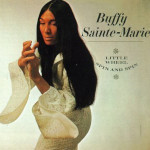
The reference to Alaska of course is to a period in the early 1960s where Alaska Natives from many tribal groups had united in an effort to gain title to lands forcibly pulled from them by Europeans. With Alaska finally gaining statehood in 1960, Buffy is using the word ‘brave’ ironically: suggesting that Washington DC cannot now dodge the issue of such injustice... an issue that had not been confronted when Alaska was “merely” a US territory... viz... with its official pre-1960 title being The Territory of Alaska.
And her reference to the “Liberty Bell”? Well, here she is being scathing in her summoning up of the famous Philadelphia Bell, which bears the inscription...
Proclaim LIBERTY Throughout all the Land unto all the Inhabitants Thereof Lev. XXV. v X.
And it ringing out “with a thud o’er Kinzua mud”?
Well that is a reference to the building of the Kinzua Dam on the Allegheny River in Warren County, Pennsylvania: one of the largest dams in the United States east of the Mississippi River. Construction started in 1960 and the dam was opened in 1965.
It was a compulsory purchase by the government. The dam meant a big loss of fertile land belonging to the Seneca nation. They protested that there were other sites for such a dam, but those alternatives had friends in high places to ensure they were not subjected to a land-grab. No such influential friends came forward to protect the Allegany Reservation, which lost nearly one third of its territory, which had been granted to the Seneca nation in the Treaty of Canandaigua, signed by President Washington.
The ‘Bill of Rights’ reference is of course a reference to a litany of such broken treaties. See here the sorry tale...
https://www.history.com/news/native-american-broken-treaties
And let me not leave that passage without a reference to that word ‘genocide’, and the way Buffy adds the word ‘basic’ and spits it out, to give it maximum impact. Superb.
A word that very few people before her had used, with regard to the often appalling treatment of the native tribes. She was the first recording artiste that I know of, who used it in song, and incurred an instant backlash from Caucasian North Americans, who thought her madly hyperbolic.
Methinks, if it wasn’t quite the genocide of Hitler and the Jews, she wasn’t that far off the truth with her use of the word.
And now we come to the verse that hit me with a sledgehammer when first I heard it...
Hear how the bargain was made for the West:
With her shivering children in zero degrees,
Blankets for your land, so the treaties attest,
Oh well, blankets for land is a bargain indeed,
And the blankets were those Uncle Sam had collected
From smallpox-diseased dying soldiers that day.
And the tribes were wiped out and the history books censored,
A hundred years of your statesmen have felt it's better this way.
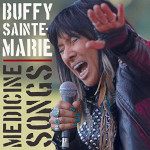
Well, Buffy could be right: perhaps the history books have been censored, because try though I may, I can find no hard evidence of this event. But that is not to say it did not happen: it could well have, and thus has been a memory passed down to successive generations of Native Americans.
And yet a few of the conquered have somehow survived,
Their blood runs the redder though genes have been paled.
From the Gran Canyon's caverns to Craven’s sad hills
The wounded, the losers, the robbed sing their tale.
From Los Angeles County to upstate New York
The white nation fattens
While others grow lean;
Oh the tricked and evicted they know what I mean.
I love that last line. She is saying “okay, you middle class Caucasian listener... you might well not buy my argument, but the tricked and evicted amongst you... hey, they will know I am speaking the truth”.
And now we are coming towards her peroration...
The past it just crumbled, the future just threatens;
Our life blood shut up in your chemical tanks.
And now here you come, bill of sale in your hands
And surprise in your eyes that we're lacking in thanks
For the blessings of civilization you've brought us,
The lessons you've taught us,
The ruin you've wrought us --
Oh see what our trust in America's bought us.
The ‘bill of sale’ of course is a reference to the compulsory purchase of Seneca land at Kinzua... and similar down the years.
And oh gosh, the power of those four internal rhymes there, viz... brought/taught/wrought/bought ... gee, they land like heavy blows to Uncle Sam’s solar plexus...
Now that the pride of the sires receives charity,
Now that we're harmless and safe behind laws,
Now that my life's to be known as your "heritage,"
Now that even the graves have been robbed,
Now that our own chosen way is a novelty --
Hands on our hearts we salute you your victory,
Choke on your blue white and scarlet hypocrisy
Pitying the blindness that you've never seen
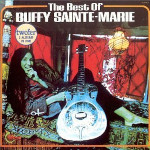
That use of heritage in the third line is spot-on, but I reckon that the fifth line there is the real proper beauty: you know how it is, when buses full of well-heeled tourists descend on poor villages in the Third World for the curious travellers to see how - what they consider to be - ‘the primitive folk’ live. (Except, strike ‘Third World’ here, and insert ‘Native American reservation’.)
And the couplet Hands on our hearts we salute you your victory / Choke on your blue white and scarlet hypocrisy is pure genius.
‘Hands on hearts’ seems to be an American obsession, whether it be US kids taking their daily Pledge of Allegiance, or the American habit of putting their hand on their heart during the singing of their national anthem. Incidentally, I suppose you know that the latter uses the tune of an old English drinking song... one that died out here in the UK, as none of our drunks could hit the notes. And, when it comes to singing their anthem, judging by what I hear from even many sober Americans like Hillary Clinton, they would be better taking their hands off their hearts and placing them over their ears...!! (In fairness, I should cut her some slack here, as it is one of the most difficult anthems to sing, even half decently.)
And another point regarding that couplet: do not let Buffy’s clever use of the word scarlet escape you... it is so often linked with another word. A word synonymous with broken treaties.
That word is ...
...lies...!!
And now, as we near the song’s end...
That the eagles of war whose wings lent you glory
They were never no more than carrion crows,
Pushed the wrens from their nest, stole their eggs, changed their story;
The mockingbird sings it, it's all that he knows.
"Ah what can I do?" say a powerless few
With a lump in your throat
And a tear in your eye --
Can't you see that their poverty's profiting you?
Wow! What an image! The eagles of war being no more than carrion crows...!! Maybe she kept the best of the lot until the end.
And she signs off with this message to what we might now call those ‘woke’ sympathisers amongst us: no crocodile tears please. Get real and understand you are part of the problem: you are living the Good Life at the Native Americans’ expense.
And she finishes with a final flourish of her truly painful assessment of the situation – a caustic line, but one always delivered with a measure of aching sadness rather than simple exasperation - ...
My country 'tis of thy people you're dying.
What a song... what a singer... what a compelling stage presence...!! I swear that, in 1930, when they came up with the word charisma, they saw 11 years ahead, and had Buffy Sainte-Marie in mind.
Dai Woosnam, Grimsby... 26/10/2021
dai.woosnam@folkworld.eu
Photo Credits:
Cree Indians:
(1) by Native American Traditional Cree Music (youtu.be/hNzft0VoDUc);
(3) by Charles Marion Russell;
(2) Dai Woosnam,
(4ff) Buffy Sainte-Marie
(6) Aretha Franklin
(unknown/website).